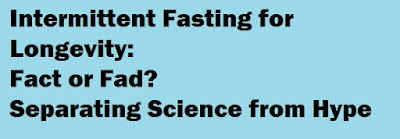Intermittent Fasting (IF) has exploded in popularity as a health and longevity hack. Celebrities swear by it, books are dedicated to it, and social media is flooded with success stories. But is IF truly the key to unlocking a longer, healthier life? Or is it just another fad destined to fade? Let's delve into the science and separate fact from fiction.
 |
The Science Behind Fasting:
Our bodies are finely tuned for both eating and fasting. When we eat, insulin shuttles glucose (energy) into cells. During fasting periods, insulin levels drop, triggering a cascade of metabolic changes:
Cellular repair: Autophagy, the body's "clean-up crew," kicks into high gear, removing damaged cells and proteins. This reduces inflammation and promotes cellular rejuvenation.
Hormonal balance: Growth hormone, responsible for cell growth and repair, increases significantly during fasting. This can benefit muscle mass, metabolism, and overall health.
Improved insulin sensitivity: By reducing your overall calorie intake and giving your pancreas a break, IF can improve how your body uses insulin, potentially lowering your risk of type 2 diabetes.
Longevity Benefits:
Animal studies have shown that fasting can extend lifespan in various species. Studies in humans are still limited, but some research suggests potential benefits:
Reduced risk of chronic diseases: IF may help protect against heart disease, Alzheimer's, cancer, and other age-related illnesses.
Weight management: IF can be an effective tool for weight loss and maintaining a healthy weight.
Improved brain function: Studies suggest fasting may enhance cognitive function and memory.
Is IF Right for You?
While IF holds promise, it's not a magic bullet and doesn't suit everyone. Consider these factors:
Health conditions: Consult your doctor before starting IF if you have any underlying health conditions.
Nutrient needs: Ensure you meet your nutritional needs during eating periods to avoid deficiencies.
Lifestyle: Choose an IF schedule that fits your lifestyle and preferences.
Popular IF Methods:
16:8 method: Fast for 16 hours, eat within an 8-hour window (e.g., skip breakfast, eat lunch and dinner).
5:2 diet: Eat normally 5 days a week, restrict calories to 500-600 for 2 non-consecutive days.
Eat-Stop-Eat: Fast for 24 hours once or twice a week.
Beyond the Hype:
Remember, IF is just one piece of the longevity puzzle. A healthy diet, regular exercise, quality sleep, and stress management are crucial for optimal health and lifespan.
Intermittent Fasting has a solid scientific foundation for potential health benefits, including increased longevity. However, it's not a one-size-fits-all solution. Carefully consider your health and lifestyle before embarking on an IF journey, and always consult your doctor. Ultimately, the key to a longer, healthier life lies in a holistic approach to wellness.


No comments:
Post a Comment